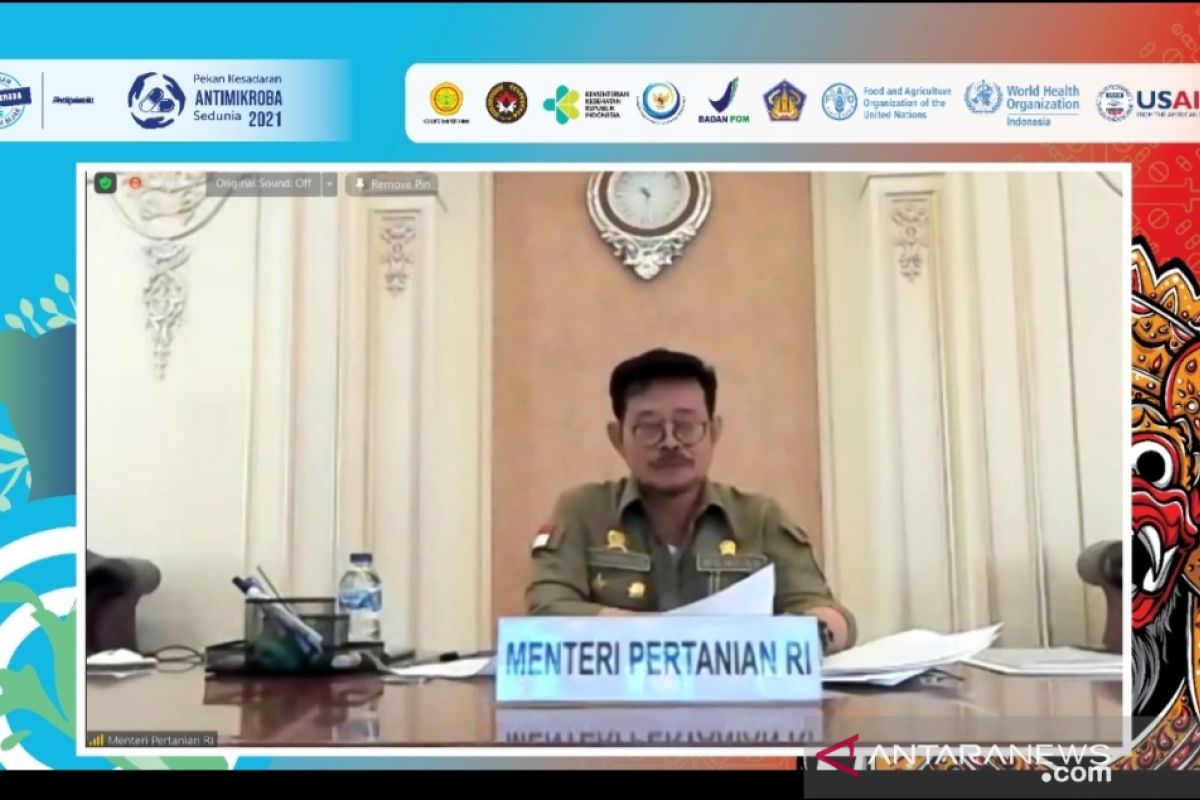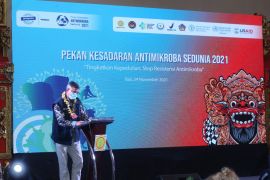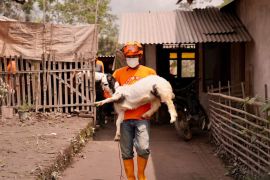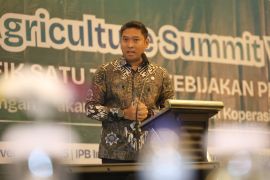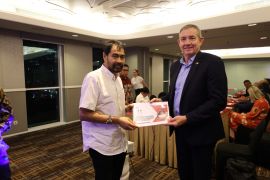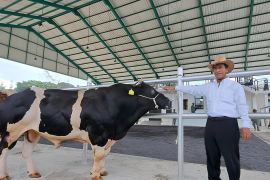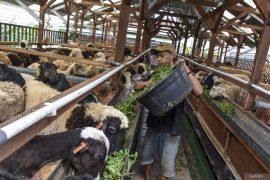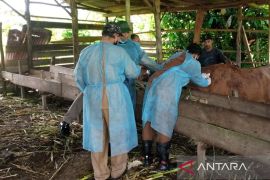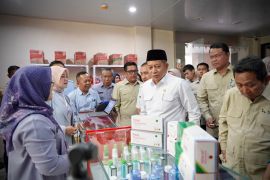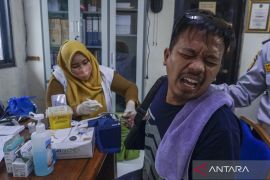Antimicrobial Awareness Week itself was celebrated since November 18 worldwide, including in Indonesia.
According to the Food and Agriculture Organization of the United Nations (FAO), antimicrobials include antibacterial or antibiotic, antiviral, antifungal, and antiparasitic agents. The public is generally more familiar with the name "antibiotics" because they are more often and widely used in human medicine.
Antimicrobials are used to prevent and treat infections caused by pathogenic microorganisms in humans, animals, and plants.
Related news: Indonesia, FAO urge prudent use of antimicrobials in farming
AMR resistance, caused by inappropriate use of antimicrobials, is currently posing a significant threat to global health, food security, crop and livestock production, and global economic development.
As per FAO data, around 700 thousand deaths every year are related to AMR, making it a “hidden pandemic” that threatens animals’ and humans’ lives worldwide.
Director of quality and accreditation of health services at the Ministry of Health, Dr. Kalsum Komaryani, confirmed that AMR resistance is an urgent public health threat.
Therefore, sustainable one-health-based responses that include humans, animals, plants, and the environment are essential to overcome the threat, she said.
During a virtual Antimicrobial Resistance Week media meeting on November 18, she said that currently, deaths caused by AMR have reached 700 thousand people per year. It is estimated that by 2050, the death toll could reach 10 million people per year worldwide.
Related news: FAO and WHO support Indonesia to control antimicrobial resistance
In addition, she said the distribution is predicted to be the highest in Asia, with around 4.7 million people, Africa 4.1 million, and the rest in Australia, Europe, and America.
According to the FAO, AMR could result in the global economy losing up to US$6 trillion per year by 2050, or the equivalent of nearly 4 percent of the global gross domestic product (GDP).
More than 24 million people will fall below the poverty line in just ten years due to AMR, especially those who live in developing countries, Komaryani noted.
Increasing poverty rates will undoubtedly increase hunger and malnutrition rates, she said. This shows that AMR can hinder the achievement of the Sustainable Development Goals (SDGs), particularly the second goal: realizing a world without hunger, she added.
Alarming increase
The use of AMR has been surging at an alarming rate in many parts of the world and hindering the treatment of infectious diseases, such as pneumonia, tuberculosis, sepsis, and gonorrhea in humans, Komaryani said.
Likewise, infectious diseases in animals, especially livestock, have become increasingly difficult or impossible to treat as antibiotics have become less effective, she pointed out.
In the agricultural and livestock sectors, this certainly will result in production losses, destroy livelihoods, and threaten food security, she predicted.
Even worse, AMR can spread through multiple hosts and the environment, allowing AMR-resistant microorganisms to contaminate food chains, she cautioned.
According to Agriculture Minister Syahrul Yasin Limpo, AMR use has become a severe threat to the agricultural, livestock, and animal health sectors regarding food security sustainability, besides threatening the sustainable development of animal health.
Related news: Ministry, FAO warn farmers on threats to poultry, antimicrobial resistance
The Ministry of Agriculture is committed to collaborating with various stakeholders to improve the capacity of the agriculture sector in facing the threats presented by AMR as well as building resilience to the impacts of AMR, he said.
Antimicrobials play an essential role in treating diseases in food-producing animals -- both terrestrial and aquatic/fisheries -- and food crops, which help ensure food security, he pointed out.
These drugs are used to treat sick animals or prevent the disease from spreading widely, he said.
The excessive use of antimicrobials in the food and agriculture sectors could threaten the food system, community’s livelihood, and the economy, he added.
The Representative for the Food and Agriculture Agency of the United Nations (UN) in Indonesia, Rajendra Aryal, also emphasized that the inappropriate use of antimicrobials in agriculture and animal husbandry is contributing to the spread of AMR and reducing the effectiveness of veterinary drugs.
Therefore, ensuring that these drugs remain effective and available to the agriculture and livestock sectors is crucial, he said.
According to the FAO, many people assume that the risk of exposure to microbial-resistant-germs only exists in hospitals or health facilities, he said.
In fact, the presence of antimicrobial-resistant microorganisms in the agricultural system leads to germs entering the food we consume, he added.
Microorganisms resistant to antimicrobials can thrive in the food chain and migrate from animals, humans, and the environment, making AMR a cross-cutting issue, he noted.
The estimated consumption of antibiotics in the global agricultural system varies widely due to poor surveillance and data collection in many countries, he said.
This figure ranges from 63 thousand to 240 thousand tons per year, he informed. Of the estimated figure, 75–90 percent comes from animal waste because the body does not absorb antibiotics, so the antibiotics are excreted again, contaminating sewers and water sources, he explained.
The environment polluted by sewage from antibiotic production can be an important reservoir for AMR, he said.
In a bid to tackle AMR, the global health system has adopts a one-health approach to promote good practices in reducing the spread of antibiotic-resistant microbes in humans, animals, plants, and the environment, he added.
Cooperation
The United States Embassy's health attaché to Indonesia, Pamela Foster, said that health security is an essential part of the more than 70 years partnership between the US and Indonesia.
For more than 15 years, the US government, through the United States Agency for International Development (USAID), has partnered with the Indonesian government to strengthen capacity in infectious disease prevention and control, and more recently, to address the emergence and spread of AMR, she added.
She said the commitment and leadership of the Indonesian government to improving awareness on AMR by using the one-health approach is essential to saving people and achieving health resilience in the country.
Related news: 150,000 Indonesians die each year misusing antibiotics on TB
In Indonesia, the National Action Plan (RAN) on AMR has been developed and implemented by cross-sectoral stakeholders, including the Ministry of Health, the Ministry of Agriculture, the Ministry of Maritime Affairs and Fisheries, the Ministry of Environment and Forestry, the Ministry of Defence, the National Agency of Drug and Food Control (BPOM), and various other government agencies, she noted.
The efforts have also included the WHO and FAO, as well as the National Committee for Control of Antimicrobial Resistance, associations, professional organizations, health service facilities (animal, human, and fishery), universities, private sector, non-governmental organizations, and the general public, she said.
The FAO has partnered with the Directorate General of Livestock and Animal Health at the Ministry of Agriculture to provide technical support to achieve the targets in the RAN AMR in the field of livestock and food production systems.
AMR is a priority area of cooperation under the Global Health Security Agenda, launched in 2014 by as many as 44 countries and international agencies, with the support of various partners, including USAID, which is the primary partner.
According to the FAO, actions for eliminating AMR will lead to a more sustainable and resilient agri-food system.
Therefore, everyone must think twice and always ask health workers for advice before buying and using antimicrobials on plants, animals, and humans.
Related news: G20 agendas to have multiplier effect on Indonesia's economy: official
Related news: E-commerce transaction value to reach Rp530 trillion in 2022: BI
Translator: Andi Jauhary, Raka Adji
Editor: Fardah Assegaf
Copyright © ANTARA 2021
